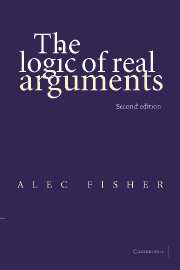Book contents
- Frontmatter
- Contents
- Preface to the first edition
- Preface to the second edition
- Acknowledgements
- 1 Introduction
- 2 A general method of argument analysis
- 3 A first example – from Thomas Malthus
- 4 Reasoning about nuclear deterrence
- 5 An example from John Stuart Mill
- 6 Arguments about God's existence
- 7 How do your mind and body interact?
- 8 Suppose for the sake of argument that …
- 9 An example from Karl Marx
- 10 Evaluating ‘scientific’ arguments. Some initial examples
- 11 Philosophical assumptions
- Appendix: Elementary formal logic
- Exercises
- Bibliography
- List of further reading
- Index
11 - Philosophical assumptions
Published online by Cambridge University Press: 05 June 2012
- Frontmatter
- Contents
- Preface to the first edition
- Preface to the second edition
- Acknowledgements
- 1 Introduction
- 2 A general method of argument analysis
- 3 A first example – from Thomas Malthus
- 4 Reasoning about nuclear deterrence
- 5 An example from John Stuart Mill
- 6 Arguments about God's existence
- 7 How do your mind and body interact?
- 8 Suppose for the sake of argument that …
- 9 An example from Karl Marx
- 10 Evaluating ‘scientific’ arguments. Some initial examples
- 11 Philosophical assumptions
- Appendix: Elementary formal logic
- Exercises
- Bibliography
- List of further reading
- Index
Summary
The method of argument analysis which is developed in this book is distinctive in employing the Assertibility Question. We introduced it in Chapter 2, we explained how to use it and we have illustrated how it works in several examples, but since it underlies our whole approach we must now attempt to answer some questions which may be raised about it. We shall first remind ourselves of our objectives and of how the Assertibility Question functions in attempting to realise those. We shall then explain some ideas about meaning which lie behind our method. We then provide a brief reply to the general challenge of scepticism and finally we explain why we attach relatively little importance to the notion of deductive validity in this whole exercise.
Objectives
Our objective is to describe and demonstrate a systematic method for extracting an argument from its written context and for evaluating it. We want a method which will apply to a wide range of both everyday and theoretical arguments and which will work for ordinary reasoning as expressed in natural language (and not just for those made-up examples with which logicians usually deal). We also want a method which draws on the insights and lessons of classical logic where these are helpful, but which is non-formal and reasonably efficient (both requirements exclude a method which requires us to translate real arguments into the symbolism of classical logic).
Information
- Type
- Chapter
- Information
- The Logic of Real Arguments , pp. 160 - 171Publisher: Cambridge University PressPrint publication year: 2004
